We recently conducted our 2021 No-Code Economy Survey to gather a comprehensive understanding of the usage and growth of no-code. While many of our customers, partners, and community are familiar with no-code, one statistic from this survey certainly stood out—82% of people are unfamiliar with the term no-code, let alone the rapidly growing movement and impact of the no-code space.
Because Formstack is a workplace productivity platform that serves multiple no-code and low-code solutions, we’re determined to change that statistic.
Enter No-Code Day!
On April 13, we will be releasing our extensive Rise of the No-Code Economy report based on the findings from our market survey. We will also be hosting a live panel discussion with some of the biggest names in the no-code space, shedding light on how no-code is currently shaping the world and why your organization should invest in no-code tools, platforms, and apps.
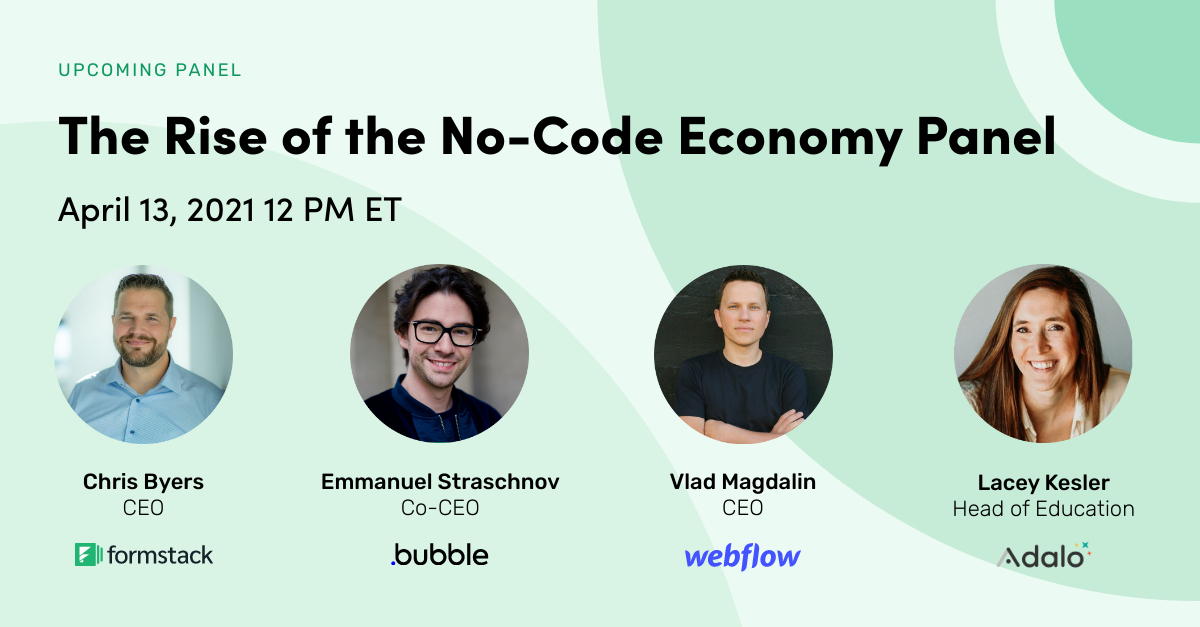
Leading up to No-Code Day, we also want to provide the means for you to not only familiarize yourself with what no-code is but also gain a thorough understanding of how no-code can empower anyone to be a creator!

Follow us on Twitter as we share insights from leaders in the space and interesting findings from The Rise of the No-Code Economy Report.
To get you started on your journey through the no-code revolution, we’ve gathered insight from various innovators in the space and will continue to add to the list as the conversation grows.
No-Code Experts Weigh In
Emmanuel Straschnov, founder and co-CEO of Bubble on why you should add no-code tools to your tech stack.
"No-code tools allow you to quickly and affordably achieve your product goals, no matter your technical background. If you never learned to code, you can build a tech product using Bubble's platform. If you want to start your own business, you can do that on your own with Bubble. If you see a need for a product in your organization, you can build it without asking the engineers. And if you are a software engineer, you can use Bubble to write repeatable frameworks and save time."
Lacey Kesler, Head of Education at Adalo and founder of Women In No-Code on how no-code will lead to more women in tech.
“Tech doesn't generally have the best reputation for being a great place for women to flourish (though I know there are significant efforts being made to make it a great place), and no-code can contribute in this way by making it more accessible. No-code is by nature inclusive because it can be applied ubiquitously across industries so that it's more accessible to use.”
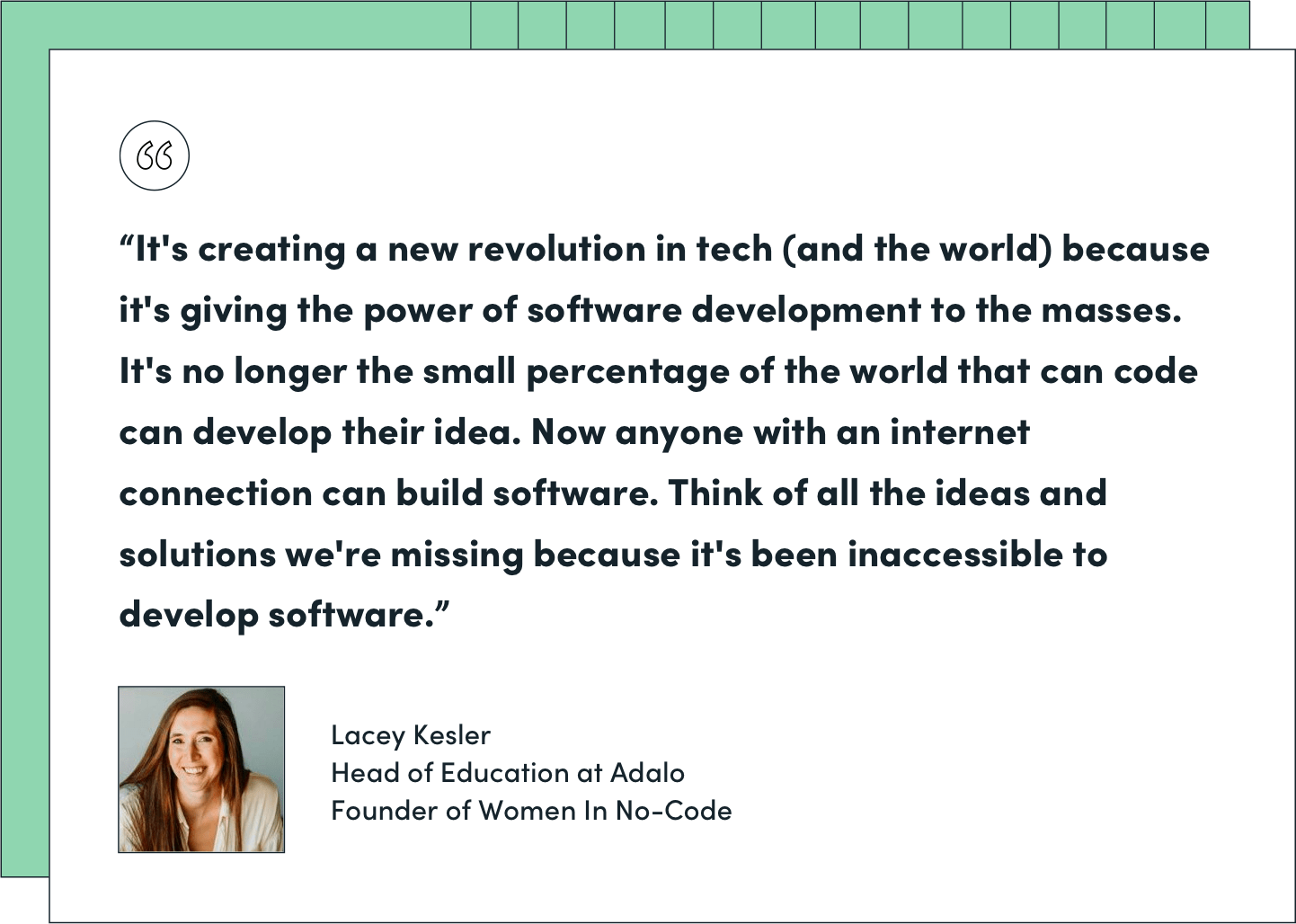
Karthik Puvvada, Program Director at On Deck on how no-code tools empower anyone to be an entrepreneur.
“No-code should be an important part of how entrepreneurs envision building their business because of the rise of the creator economy and the rise of the no-code movement. It has allowed me to simply test and validate my assumptions and ideas without needing a developer. I've built several side-projects and businesses using no-code. At my current job, 70-80% of our workflows use no-code tools like Airtable, Zapier, and Integromat. Thanks to no-code, I shipped my 1st MVP back in 2018 for an idea I had in 5 days.”
Vlad Magdalin, Co-Founder and CEO of Webflow on the the difference between low-code and no-code and how no-code enables non-technical employees and entrepreneurs.
“Both low-code and no-code help make the software creation process easier, but no-code is fundamentally more accessible to vastly more people because it aims to completely remove the need to know code (or access to a coder) to build something. Less than 1% of the world knows how to code, so low-code is typically still used primarily in environments where there’s ready access to coders (e.g. larger companies). The tradeoff is that much more is currently possible with low-code than no-code, since developers can augment the capabilities that have not yet been implemented in a low-code/no-code way.”
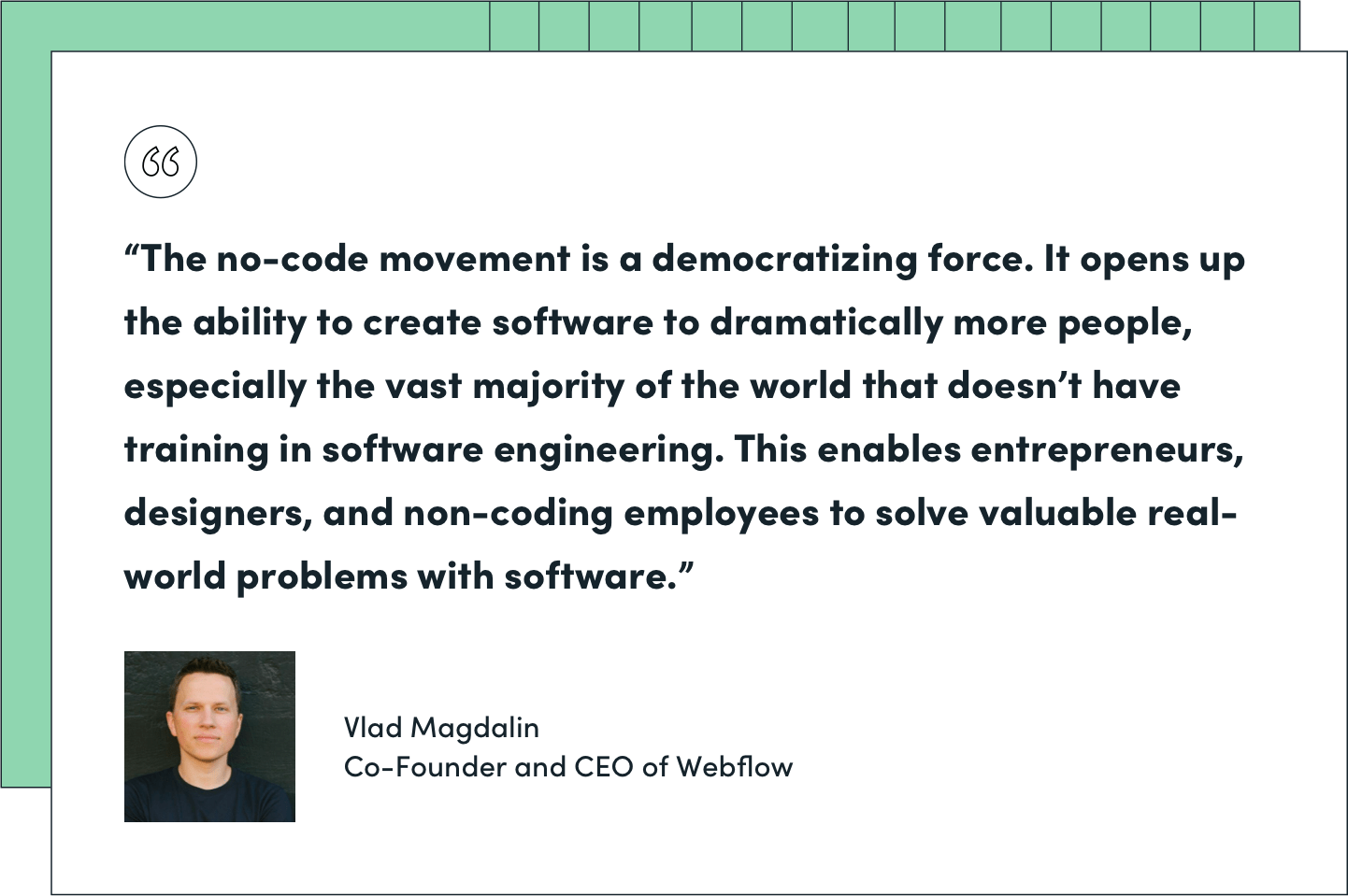
"The no-code movement will lead to orders of magnitude more software being created, and will become an important catalyst of economic growth over the next decade."
Jane Stecyk, VP of Marketing at Mighty Networks on the simplicity and power of no-code tools.
“No code tools have empowered millions of brands and creators.They have created a world where people are now able to master many things that used to require lots of coding experience, such as building websites or apps. These products offer easy-to-use features and native integrations that make it easy to set up and maintain whatever project or product you're creating. You don't need to hire app developers or explore custom development anymore. With a no-code tool like Mighty Networks, you can bring together a community, online courses, events, content, and more in one place, without having to write a single line of code.”
Andy Wingrave, Chief Automator at Saastronomical on why no-code tools have exploded over the last few years.
“Technology is moving faster than ever, and so is the business world. Even if you have a development team in-house, integrating their work quickly can take time. That’s why the No-Code Explosion has erupted over the past few years. It has allowed developers and businesses to integrate their work at a much faster pace than before. It enables them to develop their projects in a fraction of the time to meet their business needs.”
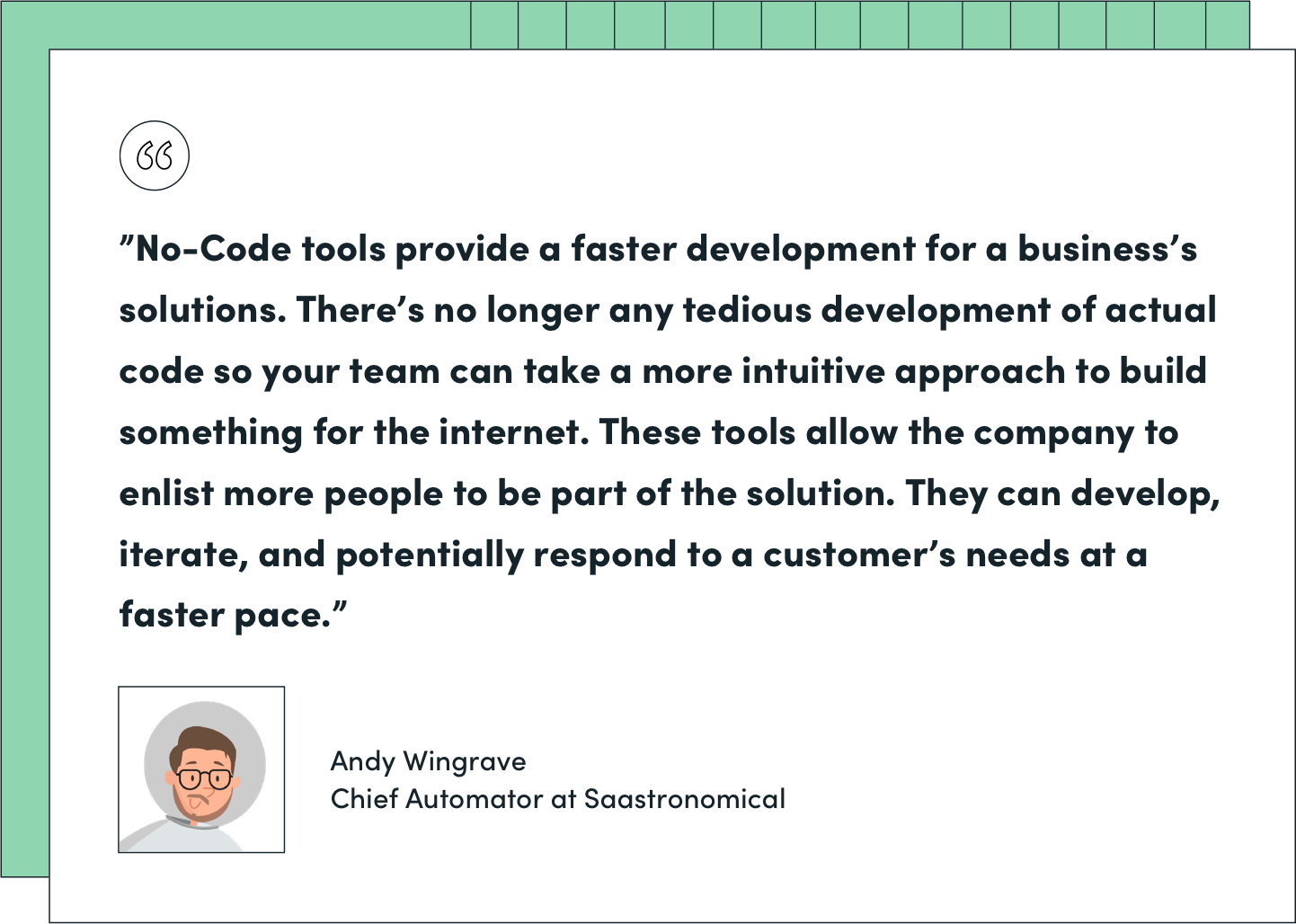
Matt Bourn, Head of Customer Success at fivexfive on how no-code tools give operational teams superpowers.
“Operational teams are the heart of any business but are often underserved by technology to create solutions to serve clients. The real power of no-code tools is the ability to connect them with tools you are already using and build something in hours to create a specific workflow or solve a specific problem. It gives operational teams superpowers to move fast and build things!”
Max Haining, founder of 100DaysOfNoCode on how no-code is creating a new revolution in tech.
“No-code gives anyone the power to be a 'creator,’ regardless of someone's ability to pay for expensive and time-consuming coding education. It gives teams the ability to automate existing processes and streamline overall operations. It gives marketing teams the ability to create growth tools, designers the ability to not only design but to create working prototypes of the features they are designing to show to product managers, and organizations the ability to test and build 'experiments' they would not commonly take, but are now able to, as a way to rapidly iterate through their product roadmaps.”
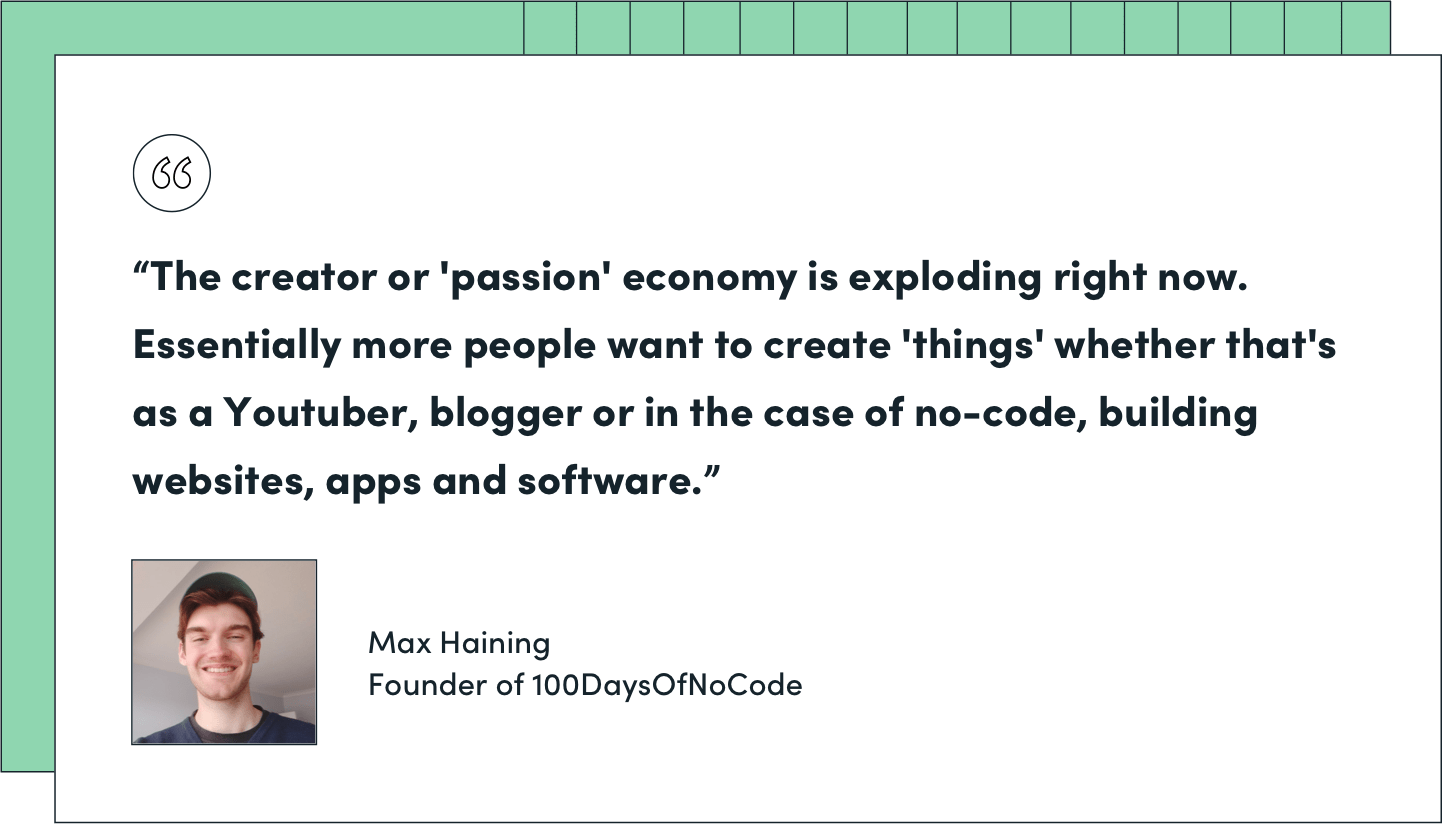
Matt Varughese, CEO of 8020 on how he got into no-code and realized it was going to be the next big thing in tech.
“As someone who previously didn't know how to code, I've always been jealous of those who did have the skills to build their ideas - they could build whatever they wanted with ease! After years of working in Squarespace and being limited by templates, I stumbled upon Webflow and loved this concept - I could code visually, but I didn't need to actually write it myself - the computer abstracted it for me! Going deeper into the rabbit hole, I discovered the entire no-code community, and I realized that this would be the next big thing in tech. I wanted to help people take advantage of the tools and opportunities that now exist without writing code.”
Art West, CEO of NoCodeDevs on his predictions for the no-code market in the next 5-10 years.
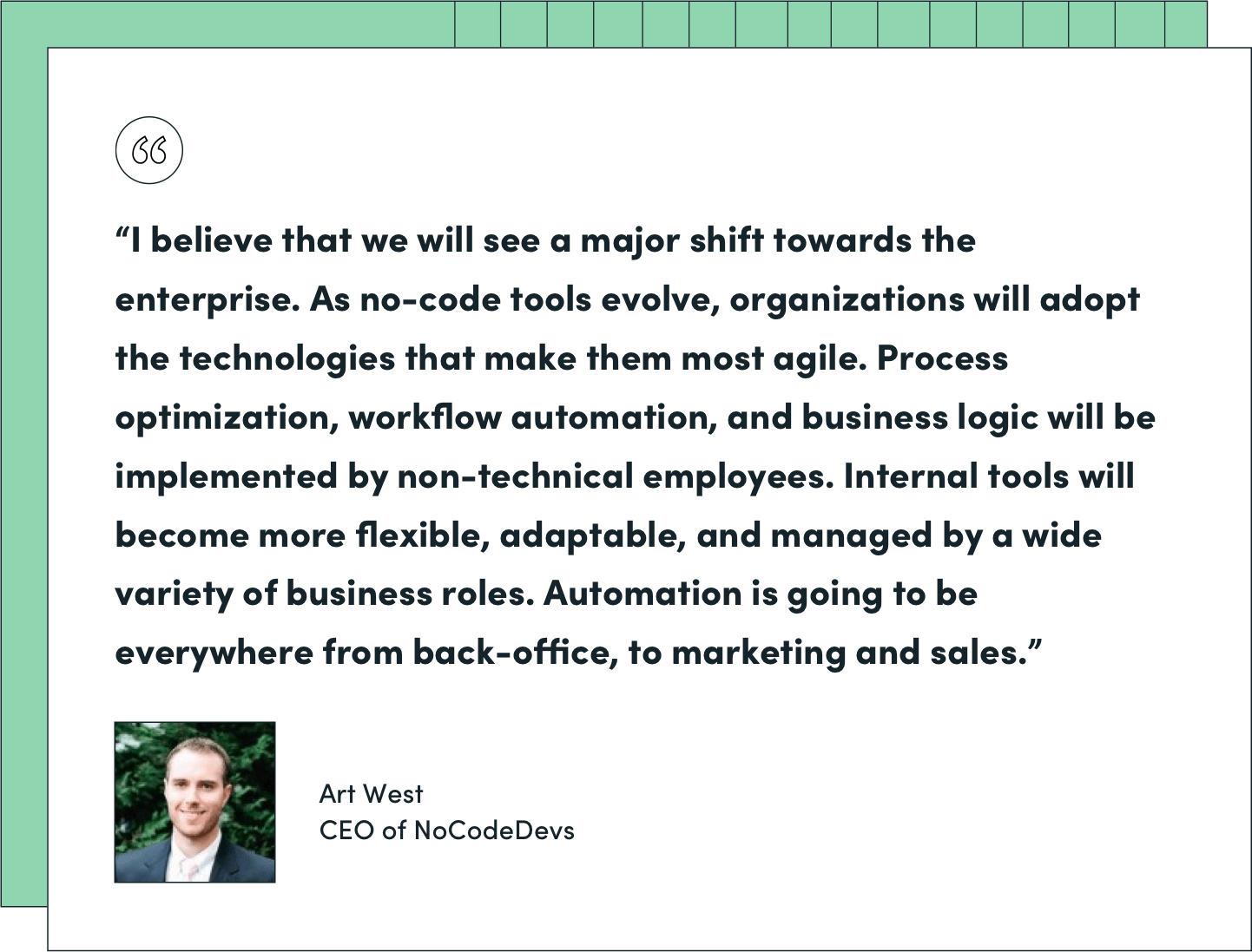
"In parallel with the shift towards enterprise, no-code tools will need to become more collaborative and open-source. Other than the enterprise, I see a huge shift towards APIs and visual connectivity of software.”
Chris Byers, CEO of Formstack on how no-code tools create new opportunities for individuals and businesses.
“At a time when so many people are out of work, no-code tools can create tremendous opportunities to upskill or build something new with just an idea and a few clicks. This is the real power of these solutions. No-code may not be new or flashy, but in 2021, it will be a powerful tool for companies and individuals to empower employees, create new opportunities for businesses, and reinvigorate America’s solopreneurs as we heal the economy.”
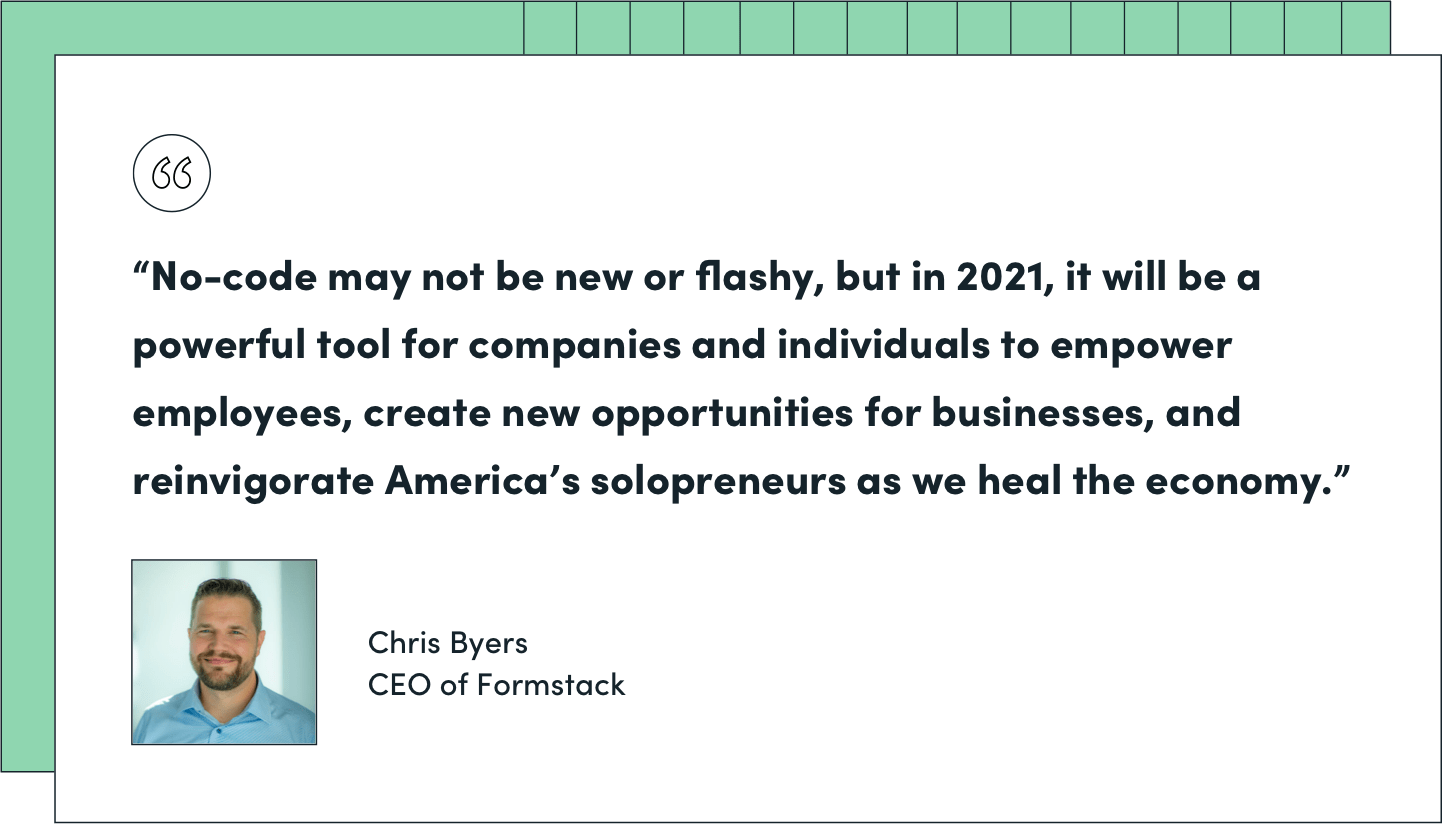
The no-code space is full of creatives, innovators, and entrepreneurs, and after No-Code Day, we hope it also includes you!
Register now for The Rise of the No-Code Economy Panel to learn about the no-code movement, plus its impact on companies and employees. By registering, you’ll receive the accompanying report, “The Rise of the No-Code Economy,” when it drops April 13.











